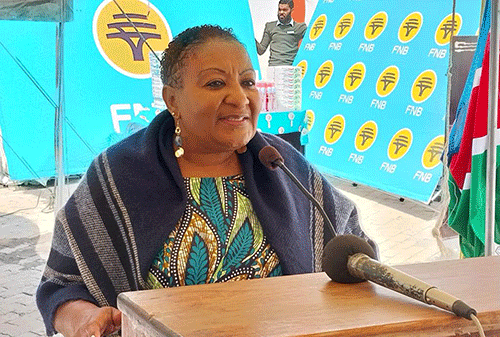Mental health is significant at every phase of lifetime, from childhood and adolescence through to adulthood. Providing for and supporting good mental health is a public health issue, which the Namibian government and its stakeholders are taking seriously.
Mental health comprises emotional, psychological and overall social well-being, and all of these put together are determined by how we reason and react to things around us, how we handle stress and make choices.
One of the most important mandates of the health ministry in Namibia is to design and implement projects and programmes that promote a healthy lifestyle, promote physical activity, a healthy diet, sanitation and the prevention of the harmful consumption of alcohol and other substances.
“Namibia is among the countries with a high suicide rate in the world. During the 2016/2017 financial year, the ministry conducted a National Study on the Prevalence of and Interventions in Relation to Suicide in all 14 regions,” said health minister Dr Kalumbi Shangula.
“The overall aim of the study was to gain in-depth understanding of key social, economic, environmental and cultural issues around suicide and attempted suicide. The study provided information on the prevalence of fatal suicides and non-fatal suicidal attempts, prevalence of suicidal ideation, causes of suicide, knowledge of suicide prevention and treatment efforts, attitudes towards suicide, as well as the types and effectiveness of suicide prevention and treatment efforts,” he explained.
He added that another mandate regarding public health is to develop strategies and programmes that are aimed at preventing and managing diseases, injuries and other health conditions through disease surveillance and health promotion, for example the promotion of healthy lifestyles.
Consultations with different stakeholders (Debmarine; Lifeline/Childline) were held to support suicide prevention initiatives in the regions. All 14 regions conducted suicide awareness campaigns through media coverage (newspapers, radio and TV); school programmes; community awareness and empowerment; and workplace awareness campaigns.
Welfare organisations also play a role as it enables institutions and groups to provide social welfare and social development services at community and household levels that are complementary to the national social welfare services.
Shangula said the registered welfare organisations and residential facilities for older people receive a subsidy from the ministry (29% of the residential facilities and 1% of the other welfare organisations receive it).
“Welfare organisations mostly focus on charity and humanitarian relief to assist the poor, disadvantaged, vulnerable and marginalised groups in society. Currently, there are 484 registered welfare organisations in Namibia,” he added.
Social worker by profession and deputy health minister Dr Utjiua Muinjangue said the dialogue on mental wellness and the role of the church comes at the dawn of the Mental Health Bill, which will replace the obsolete Mental Health Act of 1973.
“Providing for and supporting good mental health is a public health issue, and surely the church and faith-based organisations have a role to play in mental health,” she said.
The Mental Health Bill is expected to be tabled in parliament this year. Muinjangue added: “This Bill is aimed at guiding on mental health issues, and will serve to protect the human rights of patients, their families and their properties.”
The Bill will also assist Namibia in addressing challenges such as the lack of infrastructure and facilities to serve people with mental health conditions, the shortage of skilled persons as well as a lack of funding and investment in mental health.
At a recent engagement in the capital, Muinjangue said churches in the country have made a significant impact on the social structure of the population, and have not only been successful at working to articulate their faith through a variety of methods and mechanisms and spreading the word of God.
Namibia has one fully-fledged public mental health centre at the Windhoek Central Hospital, one ward at the Oshakati hospital, and one private facility in Windhoek (Bel Esprit).



